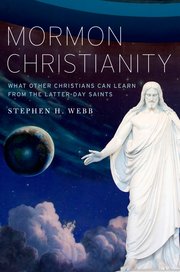Mormon Christianity: What Other Christians Can Learn from the Latter-day Saints

Mormon Christianity: What Other Christians Can Learn from the Latter-day Saints
Stephen H. Webb
Oxford Universtiy Press USA 2013
- First book by a well-respected, non-Mormon theologian to explore in depth what traditional Christians can learn from the Latter-day Saints
- Takes Mormon theology seriously from an outsider’s perspective, arguing persuasively that Mormons are a part of the Christian family tree, and that their doctrine offers valuable insights and alternatives to traditional Christianity.
- Can serve as an introductory text to Mormonism.
Mormons are adamant that they are Christian, and eloquent writers within their own faith have tried to make this case, but no theologian outside the LDS church has ever tried to demonstrate just how Christian they are. Stephen H. Webb’s Mormon Christianity: What Other Christians Can Learn from the Latter-day Saints fills this void, as the author writes neither as a critic nor a defender of Mormonism but as a sympathetic observer who is deeply committed to engaging with Mormon ideas.
Webb is unique in taking Mormon theology seriously by showing how it provides plausible and in some instances even persuasive alternatives to many traditional Christian doctrines. His book can serve as an introduction to Mormonism, but it goes far beyond that: Webb explains how Mormonism is a branch of the Christian family tree that extends well beyond what most Christians have ever imagined. His account of their creative appropriation of the Christian tradition is meant to inspire more traditional Christians to reconsider the shape of many basic Christian beliefs.
Mormon Christianity is not all affirming and celebratory. It ends with a call to Mormons to be more focused on Christian essentials and an invitation to other Christians to be more imaginative in considering Mormon alternatives to traditional doctrines.
Stephen H. Webb has taught philosophy and religion for twenty-five years. He is the author of eleven books on such varied topics as the musical philosophy of Bob Dylan, theological critiques of the theory of evolution, the importance of the doctrine of providence in American history, the role of religion in public education, and the history of vegetarianism. He has been published in First Things, Books & Culture and Touchstone.
Reviews
“Ever since the Mormon Tabernacle Choir won the silver medal in the 1893 World’s Fair, Mormons have been more renowned for their cultural than their theological contributions. In this intelligent, articulate, and highly readable volume, Stephen Webb begins to address that imbalance, bringing Mormonism into conversation with the wider Christian tradition in fresh and sometimes startling ways.” – Terryl L. Givens, Co-author of The God Who Weeps: How Mormonism Makes Sense of Life
“Mormon Christianity is truly a ground-breaking work. It’s winsome, intelligent, and generous account of the Latter-day Saints and their faith sets a new standard in interreligious dialogue. Although one may find oneself on occasion disagreeing with the author–as I do on a few points–I cannot think of a more careful presentation of the LDS worldview and the sorts of challenges and promises it brings to both Mormons and Traditional Christians alike.” – Francis J. Beckwith, Professor of Philosophy and Church-State Studies, and Resident Scholar in the Institute for Studies of Religion, Baylor University
“At once domestic and exotic, Mormon thought does not nest easily into any of the usual categories with which scholars describe Western metaphysics. This has attracted the intrepid and wide-ranging gaze of Stephen Webb, an evangelical convert to Roman Catholicism. Probing beneath crude superficialities, his analysis will provoke debate. Webb argues with imaginative brilliance that Mormonism’s ‘big ideas’ recover, challenge, and expand-rather than exceed-the bounds of Christian orientations to reality. The Mormon metaphysic thus demands a rethinking of many aspects of Christian history and tradition.” – Philip Barlow, Leonard J. Arrington Professor of Mormon History & Culture, Utah State University
“This is a sophisticated step in what can be a long-term conversation.” – Library Journal
Contents
Introduction: The Mormon Ecumenical Moment
Ch. 1: Mormon Envy
Ch. 2: The Magic of Being Mormon
Ch. 3: What’s Up with Mormons and Matter?
Ch. 4: Branches on the Family Tree: Relatives or Impersonators?
Ch. 5: Mormon Overreach? Brigham Young and Parley Pratt
Ch. 6: How to Heal Modernity’s Spiritual Breakdown
Ch. 7: Two Decisions
Appendix A: Two Theological Problems that Mormonism Solves
Appendix B: Some Puzzles Regarding Thomas Aquinas’s Understanding of Matter
Appendix C: Three Philosophical Problems that Mormonism Needs to Solve Sources and Suggested Reading
Acknowledgments
Index